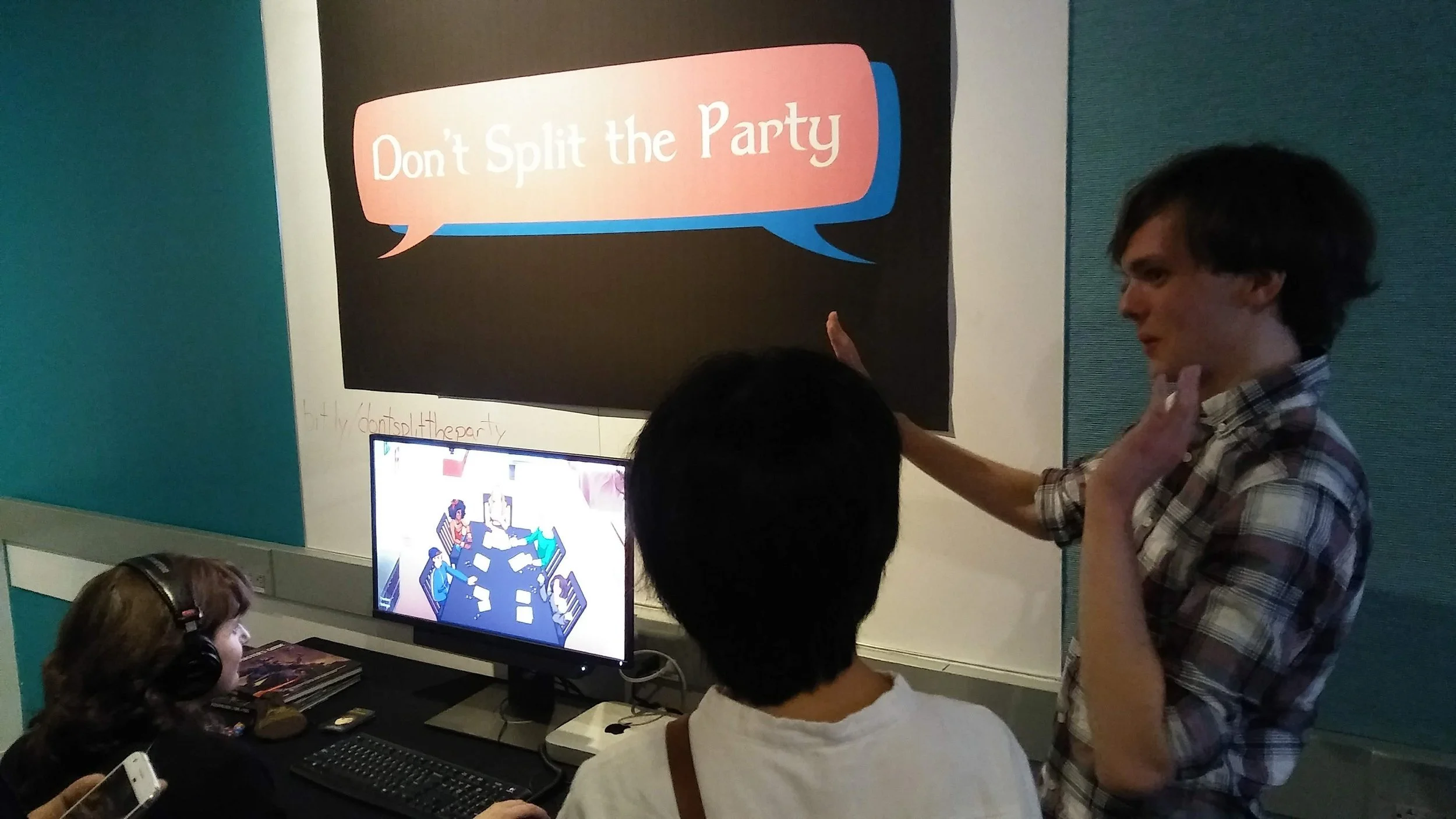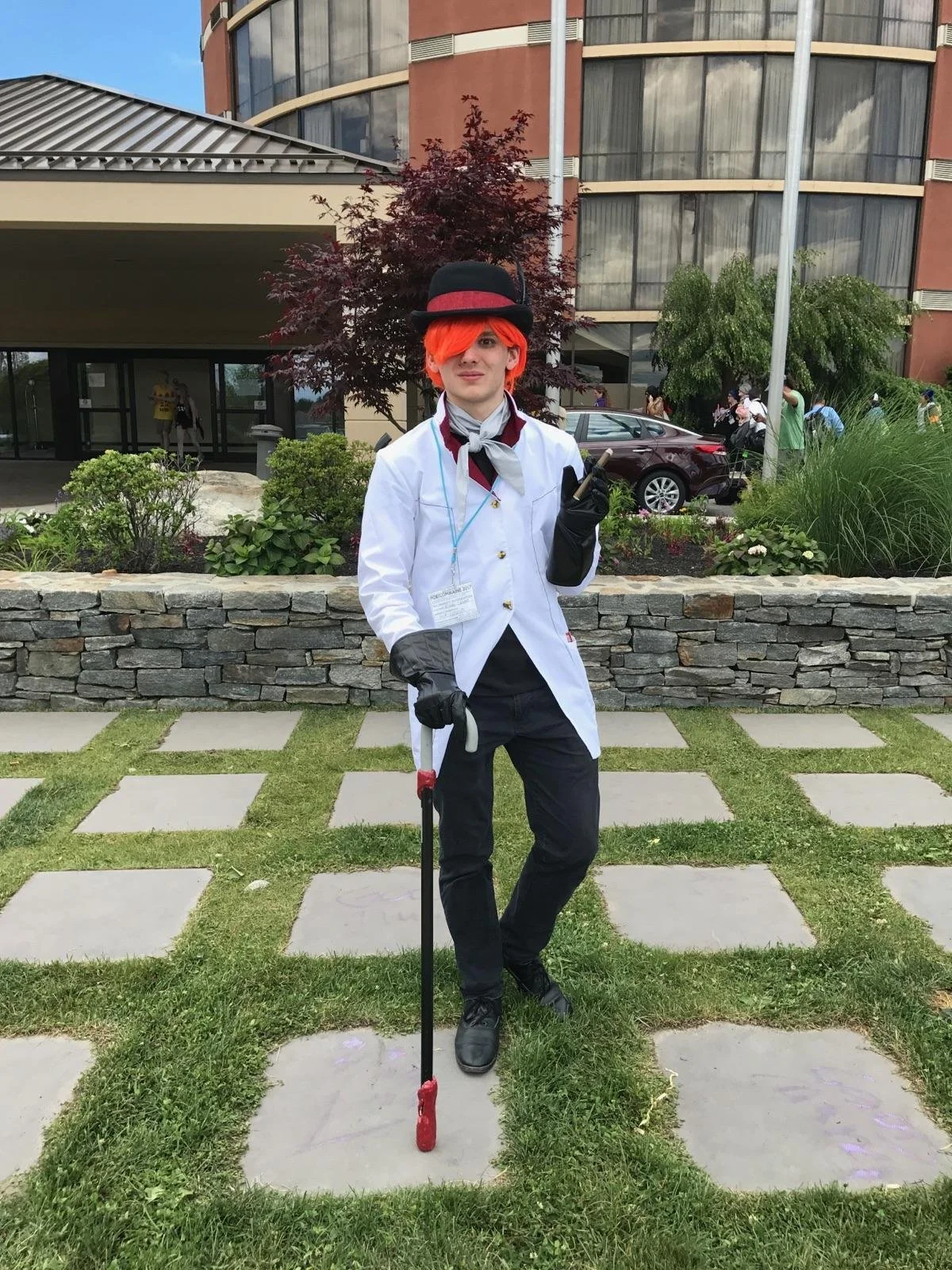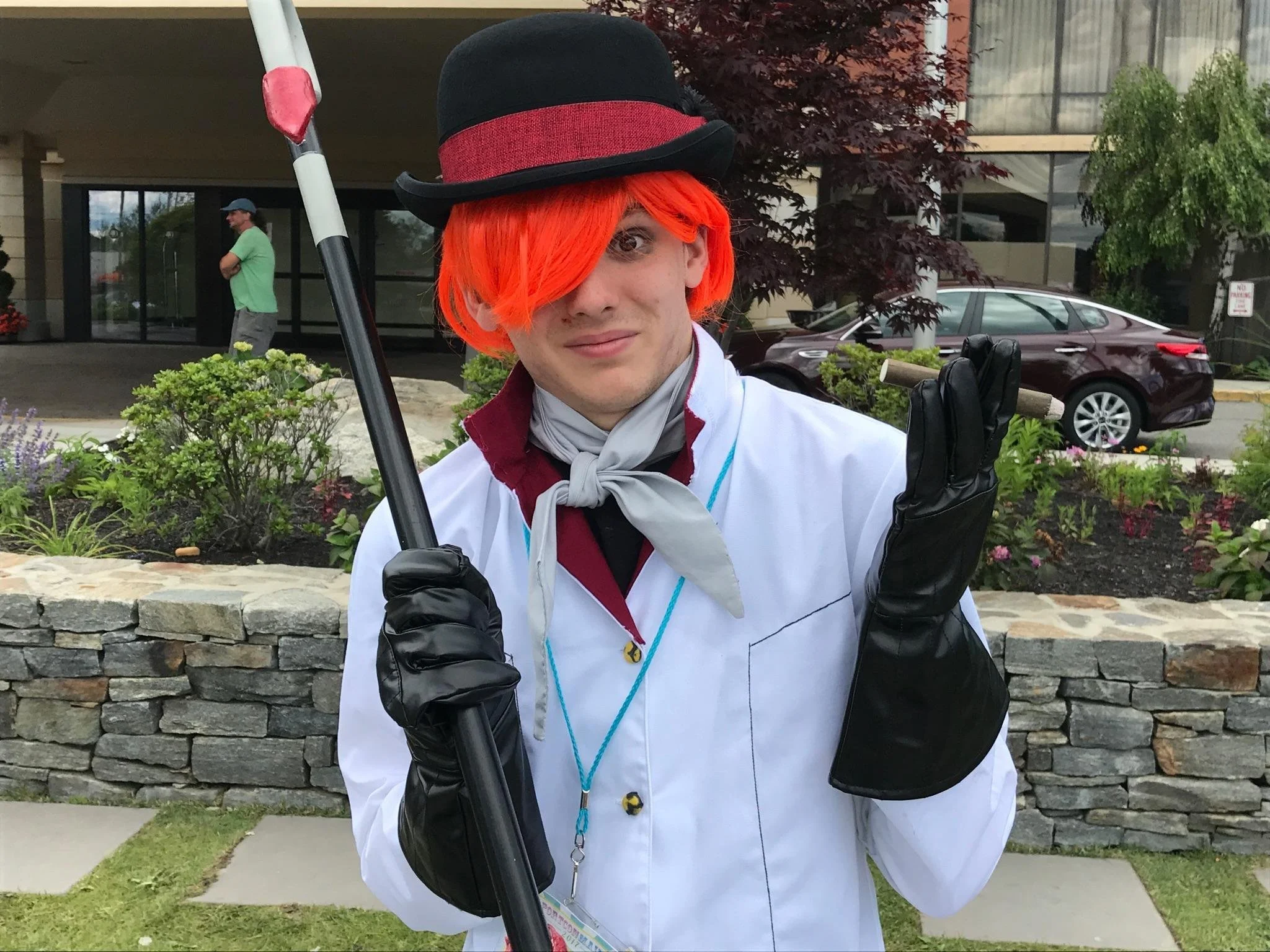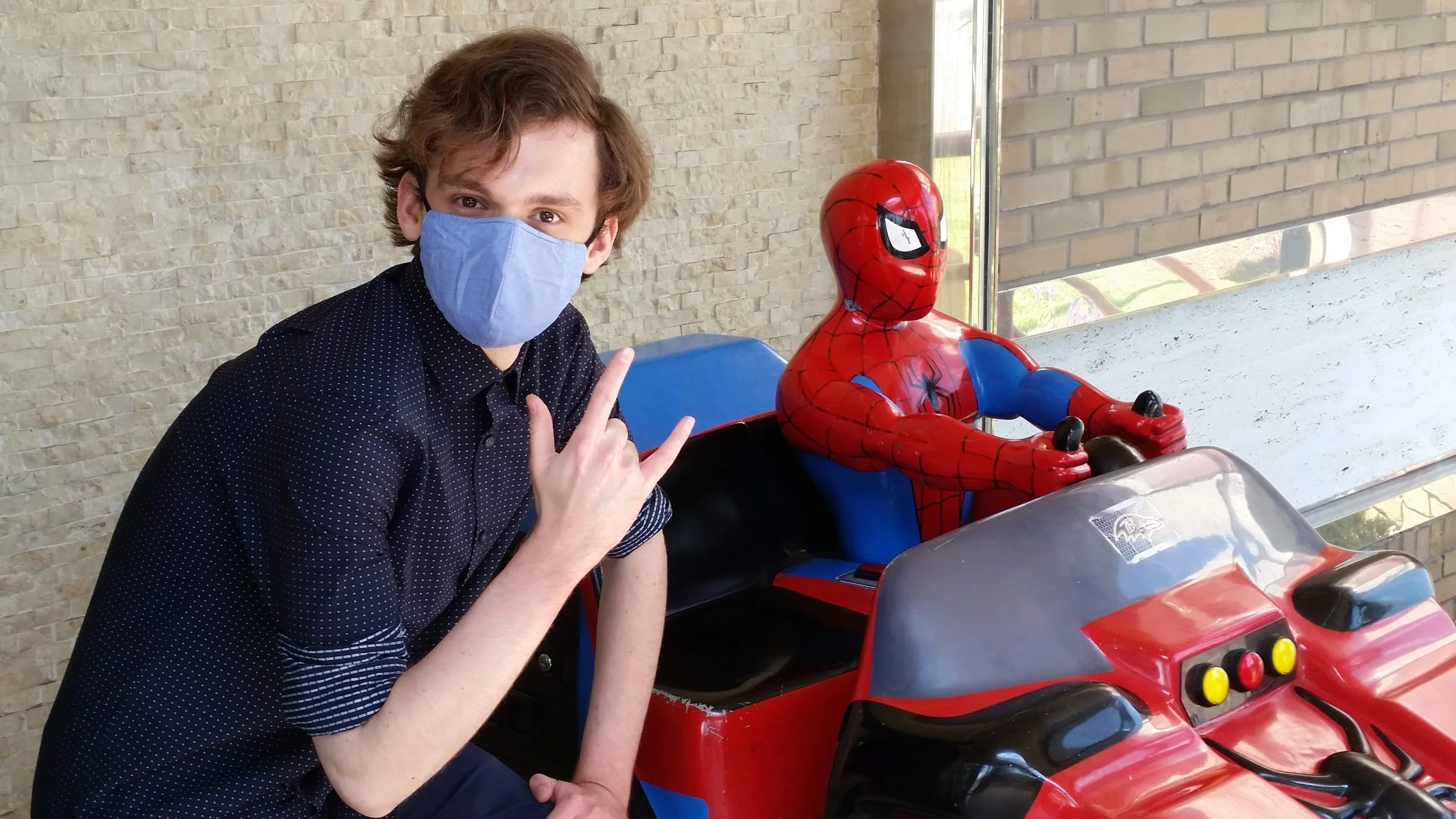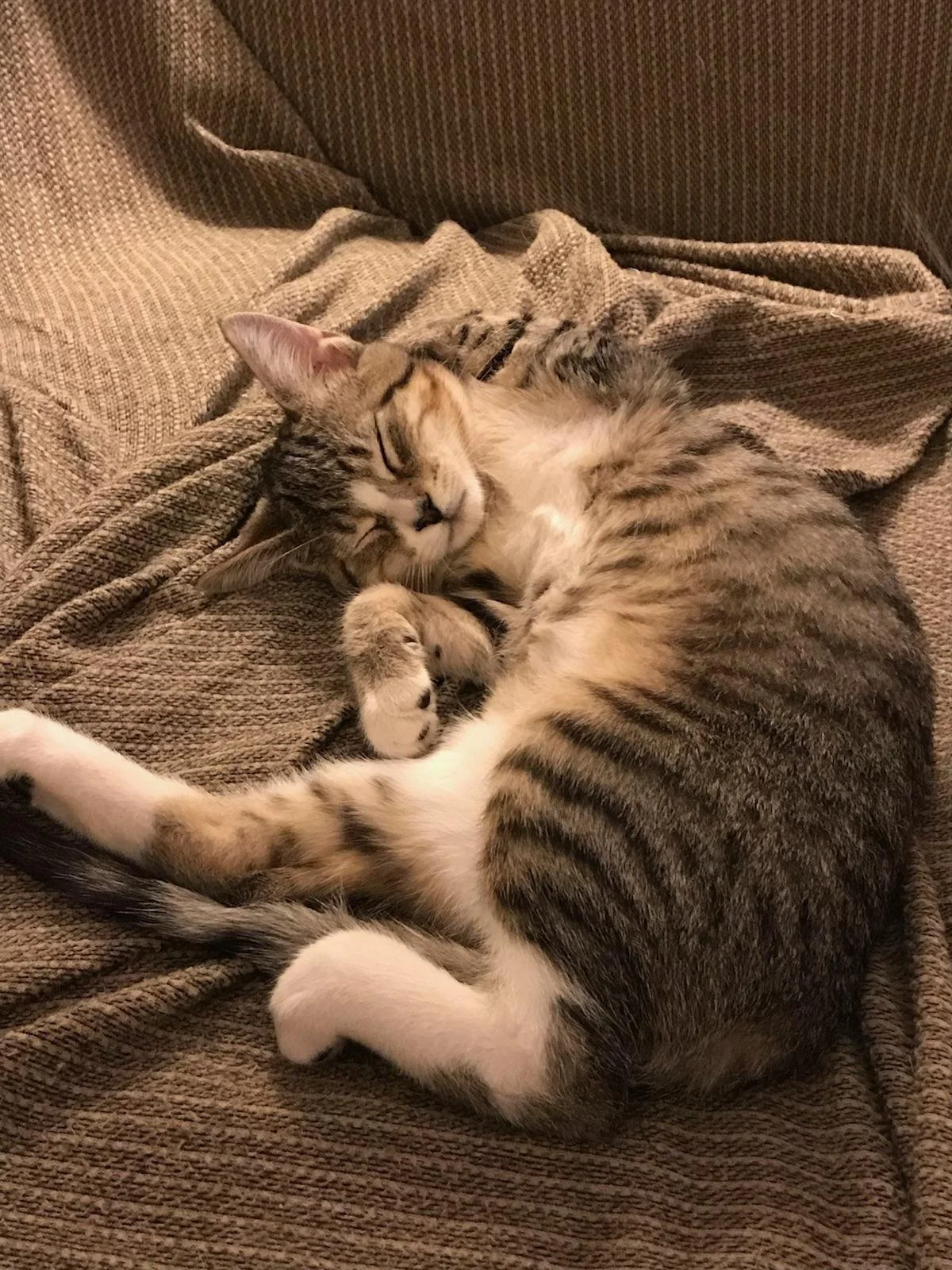August FableFriday: Nick Carbonara, Production Assistant
Production Assistant Nick Carbonara knows nothing brings people together quite like stories and games. His journey has brought him across the spectrum of the video game design process, studying game design and creative writing at NYU, dabbling in programming, and now finding a home at FableVision in the organizational side of producing. Nick’s passionate about relatable themes within unrelatable characters and the tradition of storytelling, something that connects us to our caveman days – when humans would stare at a campfire, imagining stories in their mind, dreaming of what could be. Read below to learn about his North Star (LEGO’s Junkbot Undercover), his favorite narrative works, and past campaign characters!
Columbia High School (Maplewood, NJ) Marching Band Days!
What’s your “journey to FableVision” story?
Games have always been a part of my life. Since elementary school, I have played so many games, and loved the ones on the LEGO website, especially Junkbot Undercover. In high school, I played games with a lot of friends, and from there I knew that I wanted to do narrative work in storytelling: that’s always interested me, especially coupled with science fiction and fantasy.
I focused on narratives in my work at the NYU Game Center, but I ended up being a producer also because you run your own projects there. I realized I liked producing and the organizational side of everything – planning and ensuring we meet deadlines to give us that psychological security. After graduation, I focused on narrative, but also worked as a producer on indie games.
And that led me to FableVision – this exploration of the production side of media. FableVision is really cool! Everyone has great energy as they create things that help people and educate folks. It seemed like the best place to start that production journey as the environment is very encouraging.
What made you decide to study game design in college?
There are so many small reasons. Building a game is really interesting because you create a system that people themselves have to step into. It creates these scenarios where you’re thinking about the plot but also putting in gameplay, by asking questions like, “how do the mechanics fit with the story? Is there branching? How does that change things?”
I also like that some games are very social and can bring people together to contribute to a story. And I think there’s the technical component that I enjoy. I do a little programming sometimes – I can look at a script and say, “I can sort-of kind-of maybe kind-of know what is happening here” and I enjoy using those skills. You don’t get to tap into that as much in other mediums.
Presenting at GDC in 2019
What do you think is key to a strong production process?
There are a lot of ways to answer this because production is so multifaceted. The ones that stand out to me are ones you’d expect: milestones, goals, and flexibility. But it's important to think that these goals are not merely practical – they’re also psychological and morale-based.
In some ways the reason I started moving towards production is because there were projects I worked on in school where I had no idea how I was going to get everything done in time. The idea of having a plan gave me the calm and security I needed to reduce my psychological load to actually do the thing. And for team morale, if you say that you’re working towards a specific vision and can outline it all in a document, that gives you and your team an assurance that you’re going to make something. There may be some upsets, which is where flexibility comes in, but it’s much easier to change plans when you actually have a plan.
Presenting Don’t Split the Party at NYU Game Center Showcase in 2019
What type of projects do you like to work on?
Narrative is something I like a lot – I love storytelling. In that realm, the narrative of projects I like to work on is often a mix of the fantastical, weird, or sci-fi, but with relatable themes.
For my team’s senior NYU capstone, we created Don’t Split the Party, a visual novel-style game about a group of friends who play Dungeons and Dragons and you play as their Dungeon Master, making choices about what happens to them in the campaign. But the friends in real life are fighting about various personal issues and you use the campaign to keep them from having a big falling out. And that was really fun since it had real-world problems instead of just D&D.
I’m also working on a project right now with others called Untitled Melody. It’s about two friends who move to opposite parts of the U.S. after college to pursue various artistic dreams. Although they're uncertain of their paths, they listen to the same music, which allows them to enter this dream-like state and see each other’s thoughts. It's very abstract and magical. It’s fun to work through real problems of 20-something-year-olds with weird magic on the side.
What would you like to work on in the future at the studio?
In general, each new project always feels a little unique because of the team makeup, the challenge, and the client. As a result, I think that whatever comes my way will be very fulfilling. I do love narrative things, of course, which is baked into most of the stuff we do here at FableVision.
What was your favorite game growing up?
Growing up, I loved LEGO games. I remember this Bionicle point-and-click adventure game where they had to explore the island and solve the mystery; Bionicle was this story-based LEGO line from the 2000s. I also remember the classic LEGO games, like Junkbot, where the main character is a robot who works in an office.
At NYU I attended Professor Naomi Clark’s lecture, where she mentioned that she worked on the LEGO web games. After the lecture, I talked to her and said, “wait, the LEGO web games?” She explained, “not the big ones like LEGO Star Wars or anything on console,” and I said “No, I know exactly which ones you’re talking about! I played those!”
And eventually, when I left the lecture hall it was 8 or 9 at night and I called my father and said, “Dad, you’re not going to believe this–”
She was a great advisor and teacher, outside of LEGO-celebrity-status. It was really cool to meet her and work/study alongside her.
Are you currently in an RPG campaign?
Right now, I’m taking a hiatus on RPG stuff because of how busy I am, but for some highlights of other ones I’ve enjoyed:
A Long Strange Trip was a story that used a preexisting world Ebberon, which is a mix of fantasy and pulp noir – there are detectives, international intrigue, and sometimes science-fiction. My friend took that world and made a story for it inspired by Grateful Dead songs. I played a character who was both a therapist and assassin. It was wild!
In another, everyone was looking for objects that had powers based on different aspects of reality, but dangerous forces wanted to gather them to assemble more power. My character was a former revolutionary-punk-band-member, but the rest of the band was captured by the state. He was a goofy guy who just stumbled his way through life and hung out with other adventurers. He made a lot of silly mistakes or went on embarrassing adventures that became part of his character. It was a lot of fun to be that slightly-more-clownish, heartfelt personality.
How do you combat writer’s block? What’s your writing experience like?
When I'm trying to wrap my head around a story, I have the hopefully-not-unhealthy habit of talking to myself. I find it’s useful when you’re writing. Sometimes, if I'm stuck, I just go for a walk and tell myself the story out loud. That can be helpful since you can hear it and process it in a straight line, rather than thinking about it all at once. You can think about how it would sound to a reader or a viewer or a player.
And to get a little more philosophical about it, storytelling is something that humans have always done. They’d just tell stories around a campfire, and I think you can feel closer to that by telling your story out loud. It helps you answer questions like: “how would I tell my story to others verbally? Would it sound good? What are the exciting bits? What are the boring parts?”
And then, other than that, I do lots of narrative writing for games when I can. I did some work on short stories way, way back. I’d also like to write for animation and comics one day.
More About Nick:
Favorite book: I’m not sure what my favorite-favorite is, but in terms of short stories, I love “Story of Your Life and Others” by Ted Chiang. It was made into the movie Arrival. I also like a lot of graphic novels: one of my favorites is Hawkeye: My Life as a Weapon, by writer Matt Fraction and artist David Aja.
Favorite show: I like a lot of animated adventure stuff, like The Legend of Korra and Young Justice. The latter deals with realities of being a teen or twenty-something, which are things that I really connect with.
Favorite pasta recipe: A reliable favorite for me is pasta with cream, tomato, and spinach. It’s really tasty, especially with parmesan cheese on it, and it’s an easy option. On special occasions, though, when I don’t have to be too healthy, I love carbonara. Genuinely. Unironically. It’s a fantastic pasta.
Favorite video game: That’s tough. I played a lot of Halo with my friends growing up, so that has a special place because of all the memories. I also really love the game Prey by Arkane Studios.
Favorite tabletop game: I definitely play Dungeons and Dragons the most, but I’m really excited about smaller RPGs. Lady Blackbird and Dread are both so much fun too.
Favorite rock band: My favorite is The Anix, an industrial rock act from Los Angeles. I also like David Bowie a lot – my friends and I used to listen to David Bowie when we played Halo.





